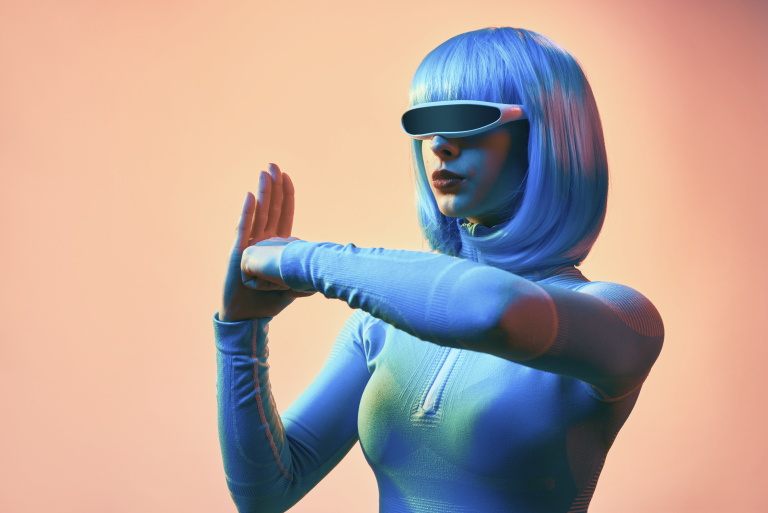The robots are coming
Imagine a world where machines can learn and adapt to our every need, a world where robots can do tasks that were only once possible for humans. Well, that world is no longer a thing of science fiction – it’s here, and it’s happening now.
AI has already transformed the way we live, from virtual assistants reminding us about our plans to self-driving cars delivering packages to our front door. And that’s just the beginning. With AI, the possibilities are infinite. We read news every day about machines that can diagnose diseases, algorithms that can predict natural disasters before they happen, and robots that can explore the depths of the ocean (and outer space)!
Speaking of outer space, we’re already seeing how this new level of intelligence is impacting the world of marketing and helping take businesses ROI to infinity and beyond. Soon, we will all be seeing AI-powered advertising that feels so personalized, it will feel like the ads were made just for us!
And guess what? They will be! In fact, some already are…
The current state of AI-powered marketing
As a result of growing competition and customers’ increasing power to choose where to buy products online, marketers are constantly looking for new ways to become more efficient, effective and intelligent when it comes to providing the best possible experience for every customer across every channel. And this includes AI.
Whether it’s an AI-powered analytics tool that tracks and analyzes customer behavior in real time, a marketing automation platform that frees you of routine tasks, or a language tool such as ChatGPT that creates personalized and relevant content in seconds, AI has already transformed the marketing landscape. In fact, 61.4% of marketers are already using some form of AI in their marketing activities.
You never know… maybe this blog post was written by AI!
There are plenty of ways in which this new level of intelligence is being used in the marketing world. From arming marketers with valuable insights to create highly personalized content, targeted campaigns and improve the customer experience, to making smarter, data-driven decisions, reducing costs, increasing ROI, and even predicting the future.
Here are some examples of AI applied to marketing to inspire you:
- Personalization: AI enables marketers to provide tailored omnichannel experiences and personalized content for each customer based on first-party data.
- Create marketing content: AI tools can help create quick and effective marketing messaging to communicate with relevance and eloquence with customers across any channel.
- Increase efficiency: AI-powered automation can streamline various aspects of marketing including content and workflows to help save time and resources while increasing revenue.
- Access customer insights: AI can help determine what your customers want by analyzing various data sources and both past and real time behavior.
- Predict the future: AI helps marketers predict the future by analyzing large amounts of data, recognizing trends and providing insights based on predictive analytics.
What businesses are already using AI in marketing?
Companies of all shapes and sizes and sectors are using AI-powered technologies to improve the efficiency and impact of their marketing activities. As an example, our marketing automation platform provides over 1,600 eCommerce businesses with AI-based solutions to achieve key business objectives and transform the results of their omnichannel marketing campaigns.
Connectif provides marketers of companies including Levi’s, Pienso y Mascotas, La casa de las Carcasas y Gioseppo with a growing range of AI tools to personalize product recommendations, segment audiences based on advanced metrics, predict the future with predictive analytics, and more recently, create quick, high-quality marketing content with an OpenAI-powered intelligent assistant.
And the proof is in the pudding (or should we say data… )! Our clients have achieved staggering results with the helping hand of our AI-powered technology, including a 10% increase in sales through smart personalized recommendations, a 270% increase in conversion through segmented email marketing campaigns and even 33% of total sales attributed directly to marketing campaigns launched with Connectif.
Are you new to AI-powered marketing?
With so much noise about the whole range of benefits that this next-level intelligence brings to marketers, it’s a great time to get started. However, with thousands of different AI tools available on the market, it can be tricky deciding where to begin.
In this article, we will cover the initial steps you would do well to consider before leaping aboard the AI-marketing bandwagon. From defining what problem you want to solve with AI, to finding the right tool and making sure you have the best data available for maximum effect, you’ll soon be the smartest marketer in town!
What do I want to achieve with AI?
As previously mentioned, AI is being increasingly used in marketing strategies for advertising, analytics, communications and content, customer journey optimization and much more. In eCommerce marketing specifically, AI is also used to provide highly relevant product recommendations and a personalized customer experience across all channels.
With thousands of AI marketing tools to choose from, a good place to start is by identifying the problem you want to solve. There may be plenty of use cases you can think of to intelligently hand over to AI, but let’s keep it simple while starting off.
- Are you looking to increase the efficiency of your marketing operations?
- Perhaps you’re looking to reduce marketing costs?
- Or maybe you want to boost conversion by implementing personalized experiences for your customers?
- Once you have identified the main problem you would like AI to solve, you will be able to start looking for the AI tools that can help you achieve it.
How do I choose the right tool?
There are so many AI tools in the market, and choosing the right one for your business can be overwhelming.
Start with some initial research about how to solve the problem you’re looking to fix. For example, if you’d like to find an AI solution for offering personalized product recommendations, try searching for “AI for personalized recommendations”, “AI for smart product recommendations” and so on.
You will start to see the name of solutions popping up again and again. Once you have an idea of the options available, narrow down your possible solutions and research them in more depth, check out their website, request a demo, read customer reviews etc.
If the vendor offers a demo or free trial, go for it!
Keep in mind that some AI tools also often require advanced technical expertise or infrastructure, meaning that smaller eCommerce businesses may struggle to implement and use these technologies effectively. On top of this, we strongly recommend you check the AI tool you’re considering offers all the capabilities you need and expect for your specific use case so you can truly address the problem you are trying to solve.
The cherry on top would be to also find a solution that leverages other AI advantages. For example, if you’re looking for a tool to help automate your email marketing, if it happens to come with an in-built intelligent assistant to serve all of your content creation needs, you can kill two birds with one stone!
Do I have enough data?
Bear in mind that AI tools require a tremendous amount of data in order to deliver.
For instance, in order for AI to make accurate predictions about specific customers and relevant product recommendations, the more reliable first-party data you can provide, the better.
Data can come from various sources, such as your eCommerce website, marketing tools, social media, email marketing platform etc. You can also collect data about the geographic location, tastes and preferences directly from your customers.
As well as the quantity of data, it’s important to consider quality too so that the recommendations and predictions made by AI are as reliable and error-free as possible.
When do I begin?
Now! The sooner you get started, the sooner you will see results.
Once you have chosen the AI tool, keep in mind what you hope to get out of it. Think of the problem you have set out to solve, and define key metrics and KPIs that you will be able to measure, such as increase in CLTV, in order to assess the effectiveness of this new AI-powered strategy.
Depending on your goal, you can start small and test the AI tool in a specific area of your marketing strategy to make sure you can monitor the results and make any necessary adjustments before going all out.
How do I stay on top?
AI has already transformed the way we do marketing and is expected to continue doing so on a much greater scale.
From enriching customer experiences powered by algorithms, to the introduction of AR and VR to create immersive online shopping experiences, and advanced analytics that will help better predict customer sentiment in real time, this is just the tip of the AI marketing iceberg.
Of course, along with the opportunities of using AI in marketing come some potential risks and challenges. For example, while AI can provide personalized experiences, some customers may feel that it currently still lacks the human touch that they prefer in their interactions with brands.
In addition, despite the hype, AI can still only accomplish narrow tasks for the time being, as opposed to running an entire end-to-end marketing process.
Nevertheless, AI is already offering huge benefits to marketers in terms of getting better marketing results at a lower cost and these benefits will only continue to grow as its capabilities grow. With this in mind, we strongly recommend marketers to start developing an AI strategy today, as well as staying informed about the latest developments and tools for empowering marketing strategies in order to stay ahead of the market.
Conclusion.
Overall, by providing greater clarity into buyer behavior and marketing performance, as well as saving time with marketing activities such as content creation and campaign launches, AI allows marketers to create more personalized and engaging experiences for customers, make data-driven decisions and predictions, while also improving their operations and bottom line.
The potential benefits of AI in eCommerce marketing are significant, and marketers that invest in the power of AI will surely see increased engagement, loyalty, and revenue. In conclusion, eCommerce businesses should embrace AI in their marketing activities to remain competitive in the market and provide customers with the customized, memorable experiences they expect (and deserve!).
What are you waiting for?
If you’re curious to learn more about how Connectif’s AI-powered platform can help solve your most pressing marketing problems, whether it’s to transform the impact of your marketing strategy, personalize your customer experience, offer more relevant product recommendations or empower your business with data-driven predictions, feel free to reach out today for a demo.




